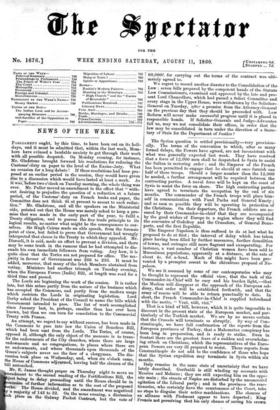NEWS OF THE WEEK.
l'AntrANrcsa ought, by this time, to have been out on its holi- days, and it must be admitted that, within the last week, Mem- bers have evinced a laudable anxiety to get through their work with all possible despatch. On Monday evening, for instance, Mr. Gladstone brought forward his resolutions for reducing the Customs'-duty on paper to the level of the Excise-duty. What an occasion for a long debate ! If these resolutions had been pro- posed at an earlier period in the session, they would have given rise to a discussion which would have lasted at least a week. As it was; two o'clock on Tuesday morning, the whole thing was over. Mr. Puller moved an amendment to the effect that " with- out desiring to prejudice the question of a reduction at a future period, of the Customs'-duty on French books and paper, the Committee does not think fit at present to assent to such reduc- tion." Mr. Gladstone, and all the speakers on the. Ministerial side, pointed out that the House was merely asked to keep a pro- mise that was made in the early part of the year, to fulfil a Treaty obligation, and to pursue the free trade principle to its logical results, no matter what might be the consequences to our- selves. Sir Hugh Cairns made an able speech, from the forensic point of view, but failed to prove that Government had wrongly interpreted that clause in the Treaty to which they appealed. Mr. Disraeli, it is said, made an effort to prevent a division, and there may be some truth in the rumour that he had attempted to dis- suade his own immediate followers from voting. Any how, it is quite clear that the Tories are not prepared for office. The ma- jority in favour of Government was 266 to 233. It must be added, moreover, that many of the Irish Members abstained from voting. Ministers had another triumph on Tuesday evening, when the European Forces (India) Bill, at length was read for a third time and passed.
The Lords are beginning the work of the session. It is rather late, but this arises partly from the nature of the business which has occupied the Commons, and partly from the modern usage which restricts the Lords in originating legislation. Lord Derby asked the President of the Council to name the bills which Government intended to pass. The list of work accomplished since January last, is, perhaps, smaller than has ever been known, but then we can turn for consolation to the Commercial Treaty with France.
An attempt, we regret to say without success, has been made in the Commons to pass into law the Union of Benefices Bill, which had been sent from the Lords. The Tories, of course, opposed it, although the only object of the measure is to trans- fer the endowments of the City churches, where there are large endowments and no congregations, to places where there are
no endowments, and where thousands upon thousands of the Queen's subjects never see the face of a clergyman. The dis- cussion took place on Wednesday, and, when six o'clock came, the House of Commons adjourned, leaving half the clauses of the bill untouched.
Mr. E. James thought proper on Thursday night to move an
Iymendment to the second reading of the Fortifications Bill, the ject being to delay proceeding until the House should be in ossession of further information as to the cost of the proposed orks. The House divided, and the amendment was negatived a majority of 143 to 32. On the same evening, a dis6ssion ok place on the Galway Packet Contract, but the vote of 60,000/. for carrying out the terms of the contract was ulti- mately agreed to.
We regret to record another disaster to the Consolidation of the Law ; seven bills prepared by the competent hands of the Statute Law Commissioners, examined and approved by the late and pre- sent Lord Chancellors, which had passed a Select Committee and every stage in the Upper House, were withdrawn by the Solicitor- General on Tuesday, after a promise from the Attorney-General on the previous day that they should be proceeded with. Law Reform will never make successful progress until it is placed in responsible hands. If Solicitor-Generals and Judge-Advocates fail us, may we not consolidate their offices, in order that the law may be consolidated in turn under the direction of a Secre- tary of State for the Department of Justice ?


























